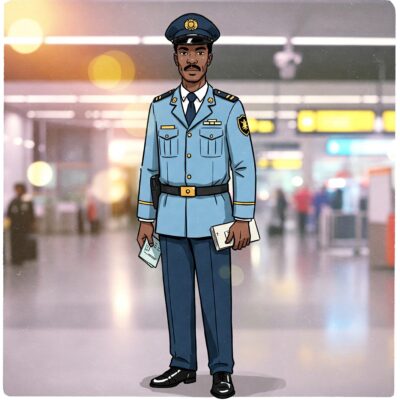Customs officers enforce trade regulations, inspect goods and travelers at border points, and ensure compliance with customs laws to facilitate secure and efficient international trade.
What is a typical day as a Customs Officer?
– Inspecting shipments and verifying documentation for goods entering or leaving the country.
– Ensuring proper tariffs and duties are applied and collected.
– Monitoring and preventing illegal activities such as smuggling or fraud.
– Collaborating with border control and law enforcement agencies to maintain security.
What else might they be expected to do?
– Use technology like X-ray scanners and databases to track shipments.
– Educate traders and businesses about customs procedures and regulations.
– Handle disputes or appeals related to customs assessments or fines.
What type of training is needed for this career path?
– A degree or diploma in Customs Administration, International Trade, or Law is beneficial.
– Training by the Kenya Revenue Authority (KRA) or equivalent government agency is required.
What kind of personality is needed to excel in this career path?
– Detail-oriented, ethical, and authoritative individuals excel in this role.
– Big 5 traits: Conscientiousness and Emotional Stability.
– Myers-Briggs types: ISTJ or ESTJ align well with this career.
What challenges can I expect to face if I pursue this career path?
– Managing long hours or high-pressure situations at border points.
– Addressing attempts to bypass regulations or evade duties.
– Keeping up with evolving trade laws and international standards.
What are the job prospects for this path in Kenya and Africa? What about International prospects for a Kenyan citizen?
– Kenya and Africa: High demand due to increasing cross-border trade and regional integration. Opportunities with government agencies, such as the Kenya Revenue Authority (KRA), and trade associations.
– International: Roles in multinational logistics firms, international trade organizations, or customs consultancy firms.
What should I focus on if I choose to pursue this career?
– Gain expertise in trade laws, import/export procedures, and tariff classifications.
– Stay informed about international trade agreements, such as the African Continental Free Trade Area (AfCFTA).
– Develop problem-solving skills to handle disputes and enforce compliance effectively.
Which other careers or job roles can I progress to?
– Trade Compliance Specialist
– Customs Broker
– Logistics Manager
– Policy Advisor for International Trade

